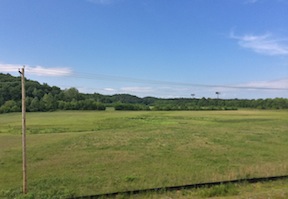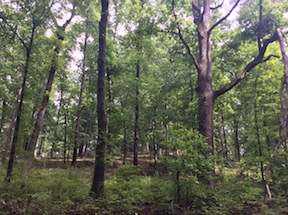Hell breaks loose in Georgia: The Battle of Resaca
 If anyone had any doubts 150 years ago that the campaign for Atlanta was going to be easy, the events of today proved that it wasn’t. Hell had indeed broke loose in Georgia.
If anyone had any doubts 150 years ago that the campaign for Atlanta was going to be easy, the events of today proved that it wasn’t. Hell had indeed broke loose in Georgia.
The Battle of Resaca proved to be the largest battle of the Atlanta Campaign, and the only one in which all three of the armies under Gen. William T. Sherman could be brought to bear against Gen. Joseph E. Johnston’s Confederates.
The bulk of Johnston’s Army of Tennessee had arrived at Resaca on May 13 and began to entrench on a chain of hills just to the west and north of Resaca, joining a small force of reinforcements that arrived there previously. They occupied fortifications built there to protect the important railroad bridge across the Oostanaula River. It was a strong, but precarious position. Johnston would fight with his back to the river and, if Sherman broke his lines, it could be a disaster of epic proportions.
By the morning of May 14, members of the famed 1st Kentucky Brigade, better known as the Orphan Brigade, were entrenched in a strong position at the bend of the Confederate line, with part of their line facing North and part facing west looking out over Camp Creek Valley. It was a naturally strong position, with Camp Creek creating a swampy obstacle about a few hundred yards away in a wide-open field, while the slopes of the range of hills they occupied were very steep. Any Union solders that reached the foot of the hill would find the climb trying.
As the sun rose behind them the Union attack began. One of the Orphans, Fred Joyce, recalled:
The Union soldiers…came tearing down the hill to the branch, and pushing through made directly for us. It was exciting. When within about one hundred yards, we turned loose on them, and death in all its appalling forms, commenced by hundreds this 14th day of May, 1864. Column after column came down in full view, and moved right toward us. Their colors were planted within seventy-five yards of us once, and remained for some time standing alone, till another came up and carried them away. Our boys all had black lips from biting cartridges, and powder stained faces, in streaks, as perspiration took a fancy to line their countenances. It was harvest time with the Orphan Brigade, and every available contrivance was used for reaping the field before us. The artillery roared and belched great clouds of smoke, which enveloped us and nearly blinded us…line after line charged us, and fell back until the little branch in front seemed to be full of men lying down under its friendly bank; they fired incessantly with their repeating guns. Night coming on, we threw pickets a short distance in front, and addressed ourselves to the important business of going in the ground.
 One of the Union soldiers unfortunate enough to be in the attack noted of the assault:
One of the Union soldiers unfortunate enough to be in the attack noted of the assault:
We had to pass over a hill and through dense undergrowth, which entirely obscured from view the rebel works until we reached the brow of the hill. From there they could be plainly seen. Gen Juda’s Brigade…met with a murderous fire from the enemy. When his first line reached a small ravine about 100 yards from the rebel works they stopped and took shelter in it. The second line being now badly exposed, advanced rapidly and took shelter in the same ravine. Our brigade still advanced to the foot of the hill. There being no room for any more men in the ravine we took position behind a rail fence, having no orders to fall back. The range was so short the enemy’s shells knocked the fence into kindling wood. We were ordered back to the top of the hill…and threw up works.
The nature of warfare was changing on all fronts with entrenching becoming a general rule for both sides.
Reblogged this on Attorney at Law Jan Vajda Namestovo, Slovakia.
I am looking for a detailed history of this battle and the units involved. My maternal great-great grandmother’s brother Solomon Hildebrand of the 63rd Indiana was wounded in the battle and succumbed to his wounds 18 July 1864. He is interred at the National Cemetery in Chattanooga, TN. I am the family historian and hope to document his service.
I am looking for the 3rd Batallion TN Artillery that was involved.